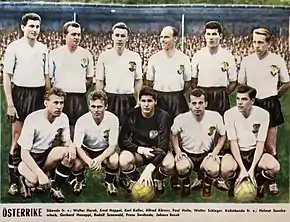Helmut Senekowitsch
Helmut Senekowitsch ([seˈnekovitʃ];[1] 22 October 1933 – 9 September 2007) was an Austrian football player and later a football manager.
| Personal information | |||
|---|---|---|---|
| Full name | Helmut Senekowitsch | ||
| Date of birth | 22 October 1933 | ||
| Place of birth | Graz, Austria | ||
| Date of death | 9 September 2007 (aged 73) | ||
| Place of death | Klosterneuburg, Austria | ||
| Position(s) | Forward / midfielder | ||
| Senior career* | |||
| Years | Team | Apps | (Gls) |
| 1955–1958 | Sturm Graz | 72 | (30) |
| 1958–1961 | First Vienna | 75 | (63) |
| 1961–1964 | Real Betis | 47 | (10) |
| 1964–1971 | Wacker Innsbruck | 160 | (16) |
| Total | 354 | (119) | |
| International career | |||
| 1957–1968 | Austria | 18 | (5) |
| Managerial career | |||
| 1971–1973 | Grazer AK | ||
| 1973–1975 | SK VÖEST Linz | ||
| 1975–1976 | FC Admira/Wacker | ||
| 1976–1978 | Austria | ||
| 1978–1979 | Tecos UAG | ||
| 1979–1980 | Athletic Bilbao | ||
| 1981 | Panathinaikos | ||
| 1982 | Olympiacos | ||
| 1982 | Eintracht Frankfurt | ||
| 1983 | AEK Athens | ||
| 1983–1984 | AEK Athens | ||
| 1984–1985 | Grazer AK | ||
| 1985–1988 | Tecos UAG | ||
| 1988 | Cádiz CF | ||
| 1989–1990 | Panionios | ||
| 1990–1991 | AC Omonia | ||
| 1991–1992 | LASK Linz | ||
| 1995–1996 | Floridsdorfer AC | ||
| 1997 | First Vienna | ||
| *Club domestic league appearances and goals | |||

Playing career
Club career
He played for several clubs, including SK Sturm Graz, Real Betis and FC Wacker Innsbruck.
International career
He played for the Austria national football team and was a participant at the 1958 FIFA World Cup.[2] He earned 18 caps, scoring 5 goals.
Coaching career
He later worked as a coach, one of his major achievements was helping Austria qualify for the 1978 FIFA World Cup, the first time Austria had qualified for the World Cup in twenty years. The Austrian team advanced to the second round in whose first match they fell 1–5 against Netherlands being coached by former international teammate Ernst Happel. Later he led them during the game dubbed The miracle of Córdoba, against arch-rivals West Germany, which the Austrians won 3–2 and which was Austria's first win against West Germany for 47 years,
References
- "LASK Doku 1991 mit Trainer Helmut Senekowitsch". Archived from the original on 21 December 2021. Retrieved 3 June 2020.
- Record at FIFA Tournaments – FIFA
- Austrian sports world pays tribute to late Helmut Senekowitsch – Federal Chancellery
- Die österreichische Fußballfamilie trauert um Helmut Senekowitsch Archived 15 July 2014 at the Wayback Machine – ÖFB (in German)
External links
- Helmut Senekowitsch at eintracht-archiv.de (in German)
- Helmut Senekowitsch at BDFutbol
- Helmut Senekowitsch at National-Football-Teams.com